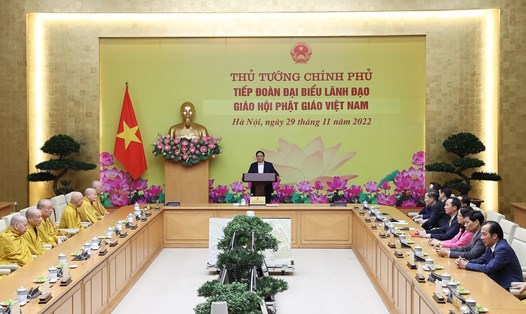On December 10, speaking with Lao Dong reporter, the National Political Publishing House Truth said that this agency has just published the book "Buddhism and the nation: From the Ly dynasty to the present".
The book outlines the role of Buddhism in the Ly Dynasty, outlines the political, cultural and social context of this period; at the same time, affirms the values of Buddhism in Vietnamese society today, the opportunities, challenges and proposes solutions to continue promoting the good ideological and cultural values of Buddhism in the cause of national construction and development.
According to the Truth National Political Publishing House, in the history of building and defending the country of our people, Buddhism has made important contributions to the formation of Vietnamese national ideology and culture. With a history of more than 2,000 years, Buddhism has integrated and accompanied as an important element in the country's cultural and social life.
In particular, Buddhism flourished and became the dominant ideology in our country's political life under the Ly Dynasty. Through nine kings with more than 200 years of reign (1009 - 1225), Buddhism, Confucianism and Taoism all coexisted and developed.
The Ly Dynasty promoted the positive and progressive elements of Buddhism to serve the cause of building and defending the Fatherland, caring for the people's lives, and contributing to building a prosperous Dai Viet civilization for more than two centuries.
During the Tran Dynasty, Buddhism continued to flourish and was one of the periods when Buddhism deeply integrated into the hearts of the people. The highlight of Buddhism during this period was its active engagement with the world: “Buddhism is in the world, not separate from worldly dharma”, inseparable from the cause of building and protecting the country.
Thanks to the harmonious combination of worldly and otherworldly qualities, Buddhism during the Tran Dynasty became a part of the national culture, influencing and impacting many aspects of social life, contributing to great achievements in the history of the Tran Dynasty.
Entering the 20th century, Buddhism continued to raise the flag of patriotism, standing shoulder to shoulder with the entire people of the country in the struggle for national liberation. Many Buddhist places of worship across the country became bases to shelter and nurture revolutionary cadres; many monks, nuns, and Buddhists enthusiastically joined the army to fight the enemy, save the country, and made great contributions to the resistance war against the French colonialists and the invading American imperialists.
Today, Buddhism still maintains its role and position in national life, wholeheartedly serving the nation and all living beings according to the motto "Dharma - Nation - Socialism".
However, Vietnamese Buddhism today is also facing many challenges, often being exploited, sabotaged, and distorted by bad people and hostile, reactionary forces.
Therefore, clarifying the great contributions of Buddhism to the cause of national construction and development is of great significance, contributing to promoting the precious spiritual values of Buddhism, enriching and deepening traditional cultural values, building human happiness and the independent and autonomous ideology of the Vietnamese people.









